#enneagram type 8
Explore tagged Tumblr posts
Text
Enneagram Types (Part 2)
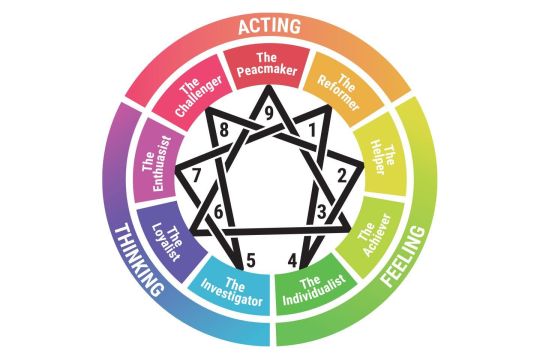
Here’s a description of each Enneagram type, including their core motivations, fears, desires, and typical behaviors, along with information about their wings:
Type 6 - The Loyalist: Core Motivation: Sixes seek security, guidance, and support. They strive to find safety and stability in their environment and relationships.
Core Fear: Sixes fear being abandoned, unsupported, or without guidance. They may worry about potential dangers and uncertainties.
Core Desire: Sixes desire to have security, certainty, and trust. They long for reassurance and reliable relationships.
Typical Behaviors: Sixes are loyal, responsible, and often seek guidance from authority figures or trusted individuals. They may be cautious, vigilant, and prepared for potential risks.
Wing 5 (6w5): The Defender
Fives bring an intellectual and independent dimension to Sixes. They may have a more withdrawn and observant approach to their loyalty and may seek knowledge to feel more secure.
Wing 7 (6w7): The Buddy
Sevens add an adventurous and optimistic element to Sixes. They may seek distraction from anxieties and look for exciting experiences to balance their need for security.
Type 7 - The Enthusiast: Core Motivation: Sevens seek pleasure, excitement, and new experiences. They strive to avoid pain and discomfort and seek fulfillment in the present moment.
Core Fear: Sevens fear being trapped, limited, or missing out on opportunities. They may avoid facing difficult emotions or situations.
Core Desire: Sevens desire to be happy, satisfied, and fulfilled. They long for freedom and a sense of abundance.
Typical Behaviors: Sevens are enthusiastic, spontaneous, and often have a wide range of interests. They enjoy seeking new experiences, possibilities, and tend to be optimistic.
Wing 6 (7w6): The Entertainer
Sixes bring a practical and security-oriented dimension to Sevens. They may have a more cautious approach to their enthusiasm and may seek support and guidance in their pursuits.
Wing 8 (7w8): The Realist
Eights add a bold and assertive element to Sevens. They may be more focused on power and assertiveness in their pursuit of pleasure and may have a stronger desire for control.
Type 8 - The Challenger: Core Motivation: Eights seek control, independence, and protection. They strive to avoid vulnerability and stand up for themselves and others.
Core Fear: Eights fear being controlled, manipulated, or vulnerable. They may worry about being taken advantage of or appearing weak.
Core Desire: Eights desire to be strong, self-reliant, and in control. They long for justice, fairness, and protection for themselves and those they care about.
Typical Behaviors: Eights are assertive, confident, and often take on leadership roles. They have a strong presence and tend to be direct and confrontational.
Wing 7 (8w7): The Maverick
Sevens bring an adventurous and pleasure-seeking dimension to Eights. They may have a more lighthearted and optimistic approach to their assertiveness and desire for control.
Wing 9 (8w9): The Bear
Nines add a calming and harmonizing element to Eights. They may have a more grounded and receptive approach to their assertiveness and desire for control.
Type 9 - The Peacemaker: Core Motivation: Nines seek inner and outer peace, harmony, and avoidance of conflict. They strive for comfort and a sense of unity with others.
Core Fear: Nines fear conflict, disconnection, or loss of peace. They may avoid asserting themselves or facing difficult emotions.
Core Desire: Nines desire to have inner stability, peace, and to maintain their relationships. They long for a sense of wholeness and unity.
Typical Behaviors: Nines are easygoing, agreeable, and often go along with others' preferences. They seek to maintain harmony and may merge with others' opinions.
Wing 8 (9w8): The Referee
Eights bring a stronger assertiveness and a desire for power to Nines. They may be more willing to stand up for themselves and others and may have a stronger sense of individuality.
Wing 1 (9w1): The Dreamer
Ones bring a sense of responsibility and a desire for order to Nines. They may strive for personal improvement and may have higher standards for themselves and their relationships.
Remember that individuals may vary within each type, and the wings offer additional dimensions to their core motivations. The Enneagram system is a tool for self-awareness and personal growth, helping individuals understand their patterns of thinking, feeling, and behaving.
Stay tune for Enneagram posts.
xoxo J.
#enneagram#enneagram type 6#enneagram type 7#enneagram type 8#enneagram type 9#self discovery#self help#personal growth#personality types#personality test#6w5#6w7#7w6#7w8#8w7#8w9#9w8#9w1#The Loyalist#The Enthusiast#The Challenger#The Peacemaker
193 notes
·
View notes
Text

CRITICAL ROLE: BELL'S HELLS (2021–) ENNEAGRAM TYPES ★
Chetney Pock O'Pea – Type 8(w7): The Independent
Eights are assertive, self-confident, and strong. They are decisive, protective, resourceful, and straight-talking, but can also be confrontational, domineering, and intimidating. Eights typically have problems with their tempers and with allowing themselves to be vulnerable. Eights enjoy taking on challenges themselves as well as giving others opportunities that challenge them to exceed themselves in some way. Eights are charismatic and have the capacities to persuade others to follow them into all kinds of endeavors. More than any other type, they stand alone: they want to be independent, and resist being indebted to anyone. Eights are extraordinarily tough and can absorb a great deal of physical punishment without complaint – a double-edged blessing, since they often take their health and stamina for granted and overlook the health and well-being of others as well. Enneagram 8w7s are ambitious and self-confident. They always seek more and don’t settle for anything. To feel safe, they can become self-protective and eventually intensively aggressive. As they are very sensitive people that can almost smell other people’s intentions, they’re not scared of showing how aggressive they can be if they feel threatened. They also struggle for love and support: they need a safe space they can trust which provides them care and assurance.
Sources: 1 2
#chetney pock o'pea#chetney#gnome#bloodhunter#werewolf#bell's hells#critical role#dungeons and dragons#dnd#d&d#enneagram#enneagram type#enneagram type 8#enneagram type eight#enneagram 8#enneagram eight#type 8#type eight#8#eight#art#digital art#photoshop#graphic design#graphic#artists on tumblr#artist on tumblr#annemarieyeretzian
21 notes
·
View notes
Photo

(via Enneagram Comparisons - Type Five and Type Eight)
#enneagram#enneagram 5#enneagram types#enneatypes#enneagram 8#enneagram type five#enneagram type 5#enneagram type eight#enneagram type 8#8w7#8w9#5w4#5w6#mbti personalities#mbti#personality types#personality typology#personality traits#personality tests
2 notes
·
View notes
Note
Sleepy I miss your drawings so much 😭😭
I KNOW ANON IM SORRY 😭😭🙏
My commission is going to be done shortly (only a few left!!)
and uhh...
I kinda... fell in love irl?
HELP ME 😭🙏😂
BUT DON'T WORRY I WILL BE BACK!!
#point is he occupies my daily thinking A LOT.#He's an enneagram 8 too like Ghost#he's BUILT as fuck#tall too#personality kinda like Ghost too but imagine he's a christian and minus the trauma#HAVE I FOUND MY GHOST?#AAHAHHAAA but idk...#i think i'm not his type.... but his behaviour is making me confused. He's so.... caring........ in a way that no one ever does for me....?#HHHHHHH#WHY IS LOVE SO EXHAUSTING#DEAR LORD I KNOW I'VE BEEN PRAYING FOR A MAN FOR YEARS (Thank you so much btw Father for sending him)#BUT MY HEART WON'T STOP BEATING LIKE A CARNIVAL WHENEVER IM AROUND HIM#I'M TIRED (don't take him away please I like this one)#PHEW kinda revealed my heart to thousands of my follower there#sleepy answers#sleepy's thoughts
71 notes
·
View notes
Text
questions to type yourself (enneagram edition)
how do you set boundaries with the world around you? (do you assert yourself, do you blend in, do you please others, etc etc)
how do you act during stress? (are you more positive, do you stay calm and try to be "objective," do you get emotional, etc etc)
how do you act in anger? do you experience it often?
how do you act in shame? do you experience it often?
how do you act in fear? do you experience it often?
how do you act in relation to others in conflict? (withdraw, go-with-the-flow, upfront, etc)
how do you "get what you want?" (more demanding + straightforward, believe it should be earned, focus on self, etc etc)
what is your coping mechanism? (do you distract yourself, do you try to act more neutral, stay in denial, try to rationalize, etc)
#enneagram#enneagram 9#enneagram 7#enneagram 4#enneagram memes#type 4#type 9#type 5#type 6#type 7#type 8#type 1#9w8#4w5#4w3#5w4#5w6#6w5#6w7#7w6#8w7#8w9#2w3#3w2#type 3#enneagram 8#enneagram 3#enneagram 9w1#9w1#enneagram types
165 notes
·
View notes
Text
Enneagram 4 Subtypes Explained
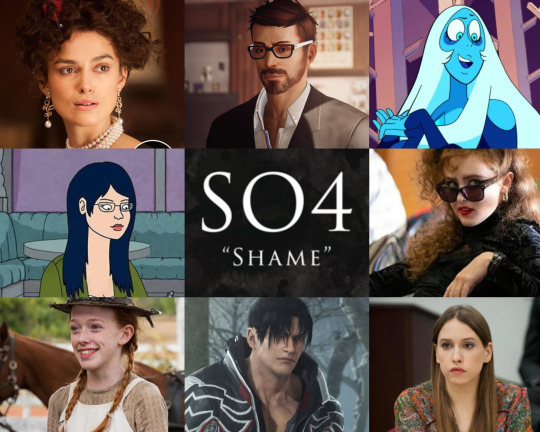


Social 4 "Shame"
The social 4 looks to create connection with others through the exploration melancholy and brokenness. Unlike the other 4s this subtype looks to share their depth with others. Imo they subvert allot of the traditional notions of the E4. They aren't as withdrawn as the SX and Sp subtypes. And whole they do maintain a level of difference within they still look to fulfill that need for emotional depth with others. A tendency that pops with the So4 is the need to create that social circle while struggling to remain their own self. This subtype tend to express their difference through being an outsider or extremely sophisticated with unique tastes. Usually among to attract others while maintaining their boundary of eccentricity. They are hard to mistake as any other type in my opinion however they can look like the stereotype of a 3w4 (due to being pretentiousness) or a 9.
Characters: Anna Karenina, Mark Jefferson, Blue Diamond, Diane Nyguen, Lisa, Anne of Green Gables, Jin Kazaa and Catherine Meyer.
The Self Preservation 4 "Tenacity"
The Sp4 finds it self trying to mitigate their envy due to being a counter type. Usually this 4 is not looking to be different but rather to have a different type of life. As the counter type of 4 they dont overexposes their melancholy and rage but rather they tend to keep it to themselves. This 4 tries to find a different path in the world without following tradition or social expectations. They are a bit more idealistic with their pursuits choosing lifestyles, style or professional life. This subtype can look like a 6 (due to their calm and environment oriented thinking).
Characters: Elio Perlman, Rose DeWitt Bukater, Eleven, Belle, Sebastian, Wicked Witch, Violet Harmon and Susana Kaysen.
The Sexual 4 "Hate"
Probably the most well known 4. This subtype is the most expressive and "aggressive" about their sense of uniqueness. They are highly interested in creating a relationship with another that fulfills that bond of difference and uniqueness. They tend to be the most expressive of their envy. To the sexual 4 the most important thing is not to be mediocre. By this I mean that the 4s see everything that doesn't have emotional and personal depth is beneath them. While many texts describe them as aggressive id say they are closer to passionate. The SX4 interest and frustration find depth within interpersonal relationships leads them to look like enneagram 8s.
Characters: Kylo Ren, the phantom, Maleficent, Loki, Jason Todd, Helen Sharp, Lucille Sharpe and Zuko
#mbti#mbti personality types#ennegram#zodic signs#personality typology#typology#zodiac#enneagram#personality types#16 personalities#enneagram 4#4w5#infp 4w5#4w3#enneagram type 4#su blue diamond#life is strange#death becomes her#jin kazama#tekken 8#tekken#elio perlman#violet harmon#loki laufeyson#loki#jason todd#zuko#kylo ren#beauty and the beast#anne of green gables
126 notes
·
View notes
Text
𝙲𝚑𝚒𝚕𝚍𝚑𝚘𝚘𝚍 𝚘𝚏 𝙴𝚗𝚗𝚎𝚊𝚐𝚛𝚊𝚖 𝚝𝚢𝚙𝚎𝚜
𝚃𝚢𝚙𝚎 𝟻 : 𝚝𝚑𝚎 𝚒𝚗𝚟𝚎𝚜𝚝𝚒𝚐𝚊𝚝𝚘𝚛

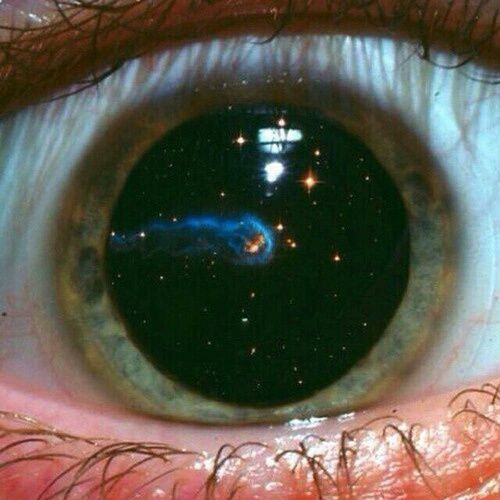
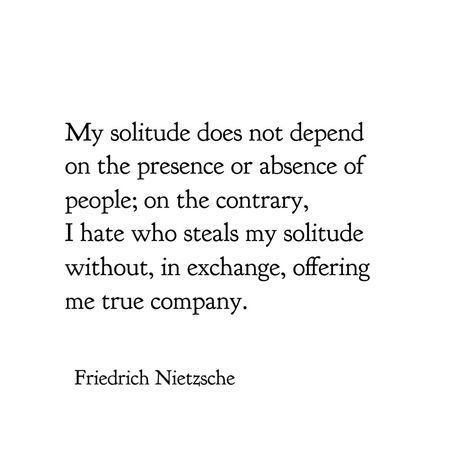
the quiet kids, kids who like to disappear inside their own mind, kids who don't want to lose the safety it provides. Its likely that E5 kid didn't feel nurtured enough, especially by their mother which caused the painful feelings of longing, isolation. To defend themselves against those feelings the kids started to occupy their minds with something else, they retreated into their mind. The kids thought by not wanting any emotional nourishment from the nurturing figure they can truly become independent. Its possible the kids never felt safe with their family. Detachment & forcing themselves to not desire any emotional engagement with others became their defense mechanism. As a child it feels very overwhelming and unsafe for them to leave their mind. When the E5 kids needed other people's mental support the most in order to survive , they were neglected & left alone. Most likely the mother figure was unresponsive to E5 kid. As an adult, they are forever stuck in the last & third phase of separation "detachment" since childhood.
{ writing this was a bit uncomfortable for me as an E5 because it brings back the painful feelings from childhood. }
#psychology#enneagram#mbti#personality types#introvert#enneagram 1#enneatypes#enneagram 5#5w6#5w4#enneagram 8#intp personality#intp memes#mbti intp#intp problems#intj#mbti intj#intj personality#intj female#mbti personality types#mbti memes#mbti types#mbti personalities#entp#entp memes#entp personality#entp problems
729 notes
·
View notes
Text
The Enneagram Explained ⚔️ Defence Mechanisms & Self-Sabotaging Behaviors 💣🔪
By Larissa
(This is an excerpt from a workshop I taught in 2023) If you want the accompanying "Unf*ck Yourself" mini workshop + pdf workbook join the membership and get it instantly. I apologize for how dry and cringe the names/descriptions are.
To watch/listen instead:
youtube
One of the main ways you can stop operating out of autopilot, quit the shit patterns and actually get what you want is by:
Being with the discomfort of not operating out of your personality trap + shadow (being conscious, making different choices, regulating your nervous system in the moment with breath, tapping, affirmations).
Integrating the opposite of your personality's "belief" (the shadow).
This sounds simple but it actually requires a considerable amount of bravery and determination. Which is why most people who learn the Enneagram don’t actually use it for self-growth. Because it’s more fun to chit chat about and study than to actually apply to our own lives.
The personality’s belief structure creates behaviors and defense mechanisms. These beliefs and behaviors create the shadow.
The defense mechanisms come from Freud's psychoanalytic theories and have been correlated to Enneagram theory by multiple sources and evolved over time with other people's ideas (Fritz Perls, Oscar Ichazo, Helen Palmer, Naranjo, etc). I won’t be getting into any of that, I’m just going to apply them in how I see them as useful. I’ve also added behaviors that I notice in each of the types.
I’m not sharing these to shame anyone or be judgmental, because we’re ALL doing at least one, if not three or more of these patterns. I’m using the Enneagram as a framework to show you how to spot patterns, unuseful beliefs and shadow at a much quicker pace than if you’re just doing it from just generic journaling prompts or waiting for something to “happen” before you address it. This way you have a pathway to start looking at the problems before your life goes to total shit.
Each type’s flawed belief (“If I am not ___ I don’t exist /I am not me/I am not safe”) manifests itself through behaviors and actions.
This process is unconscious. Even if you were aware that you were doing some of this stuff, it’s not your fault. It’s what we were programmed to do. But by integrating our shadow and coming into acceptance and wholeness we get to make better choices, think supportive thoughts, feel better, more useful and aligned feelings. And you can also catch yourself in the act and check yourself before you wreck yourself.
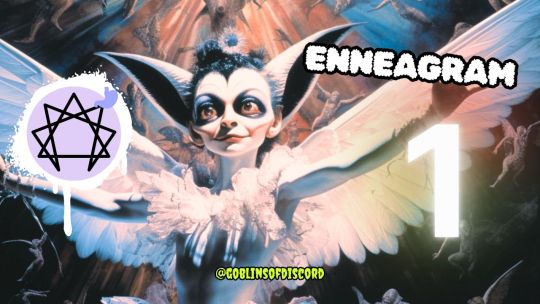
ENNEAGRAM TYPE 1 - “DADDY”
1’s prefer to see themselves as being conscientious and above the degenerate riff raff. They’re proper, correct and in integrity, therefore they cannot see themselves as lazy, foolish, wrong, messy or "bad.” Of course, when going too hard into the personality type’s false belief, it creates a big ol’ shadow.
1’s avoid outwardly expressing anger to remain “objective” and in control. Because expressing “anger” is “bad.” To be imperfect, incompetent, wrong or out-of-control is death to the 1. This mechanism reinforces the 1's ego because it assures them that they are right, proper, perfect, and correct. Therefore, their survival and identity continues. However, because the 1 is an anger/gut type, they’re constantly churning irritation factories.
If the 1 catches themselves in the act, or someone else does (gasp), it may increase the dissonance between the Shadow and Unintegrated Self if they don’t understand that it’s just their personality bs. Because the 1 utilizes “anger” they are unlikely to allow themselves to see themselves as incorrect, in the wrong, imperfect.
How this manifests:
Reaction Formation: 1’s can express the opposite of their actual feelings and desires. They do this to reinforce their ego as “not being angry” (being perfect, right, correct, proper, good). Expressing anger is “bad” or what people who have no self-control do.
Channeling unexpressed anger into physical activities - going hog wild on cleaning, obsessively exercising, restricting food/hedonistic delights, perfectionism fixations, taking a red pen to their life.
Criticality + judgmental concerns projected onto people around them, for their “own good.” To the 1 they’re being responsible, doing the right thing.
Splitting: Seeing things in black and white under stress (this is good, this is evil). In super low health this can lead to extreme behaviors, like witch-hunting, finger-pointing, being the ‘voice of God’ / judge, jury and executioner.
Rationalization: 1's can rationalize to justify their self-righteousness. “This is the most correct, right, or efficient way to do the thing, therefore I am right and you are wrong.” If you don’t do what I say, it will be to your own detriment.
Hypocrisy: Projecting their own denied desires, feelings and even private behaviors by condemning the same desires, feelings and behaviors in others. They know the right way to be, and you are not being it. They can become preachy about whatever they take issue with, in order to unconsciously overcompensate for their secret bad behavior or naughty thoughts. This ties directly to Shadow Work, because 1's and 1-fixers can have a pungent Shadow full of all kinds of misdeeds and “dark” desires, but be totally blind to them while criticizing others for the same things.
Example: The anti-gay politician who is having an affair with a man, or the barbiturate-poppin' mom who wages a neighborhood campaign against drugs.
OCD: Obsessively creating more order and rightness in their physical environment, relationships, or self. They can go into “perfecting” mode in order to feel in control of something they cannot control, where they exert order onto their surroundings and right wrongs (like becoming obsessed with cleanliness in their home or laying out ‘rules’ that others must follow).
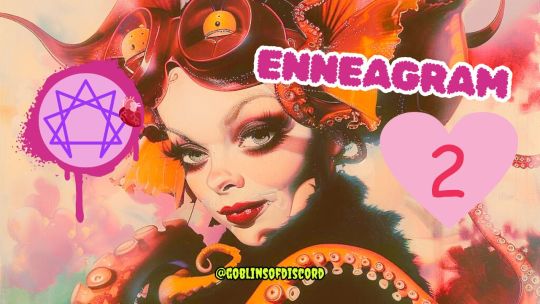
ENNEAGRAM TYPE 2 - “MOMMY”
2’s prefer to see themselves as being loving, nurturing, selfless, self-sacrificing, caring towards others, concerned and kind-hearted. Therefore they cannot see themselves as selfish, self-centered, giving to get, cold, heartless or "bad”. Of course, when going too hard into the personality type’s false belief, it creates a big ol’ shadow.
2’s avoid feeling selfish or needy, by refusing to directly ask to get their needs met or receive what they truly wish from others. 2's unconsciously repress these needs and desires to reinforce their type's ego because it assures them that they are self-sacrificing, needed, good and loving. Therefore their survival continues.
If the 2 catches themselves in the act, or someone else does (gasp), it may increase the dissonance between the Shadow and Unintegrated Self if they don’t understand that it’s just their personality bs. Because the 2 utilizes “pride” they are unlikely to allow themselves to wallow or even acknowledge any wrongdoing or selfishness on their part. It’s the other person’s fault, the 2 is blameless.
How this manifests:
Repression: 2’s hide their needs and "selfish" desires from themselves in order to maintain their caring and indispensable self-image. They use Repression to AVOID feeling needy, unnecessary or rejected. Because of their type structure, they can't see how they are in need of anyone else's help or how they are anything other than self-sacrificing. They cover up these feelings with flattery, offers of help, being intrusive and overly nice.
2’s prioritize others’ needs in the hopes someone will prioritize theirs. But then when that happens, the 2 goes into rejection mode and wants to get back into position as ‘the helper’ as that’s where their identity is invested.
The 2 projects their needs onto those around them by being overly helpful or intrusive. If they feel like they're not being appreciated or getting their needs met, they can move into covertly "punishing" behaviors to the person they keep giving to or subconsciously create situations in which the person might be forced to give back to them.
Example: The 2 wants help cleaning from their spouse, so over-cleans to the point where they become ill so that their partner is forced to pick up the slack or show them care for all of their self-sacrificing. This can also manifest in ways like them offering to do something and then making the other person wait to receive if they are feeling secretly resentful or not shown adequate appreciation or having their self-image adequately validated.
In low health, 2’s can use “Identification” to take on the needs and worries of those around them as if it’s theirs. They become fretful over other people’s problems. Anything that hurts their loved one hurts them. And it becomes covertly narcissistic, wherein they can make someone else’s suffering about themselves, but also their wins. “If it wasn’t for my help, they wouldn’t have accomplished that.” They can secretly (or not secretly) want undue credit for “help” they’ve provided (whether solicited or not).
2’s use “Reframing” in collaboration with “Repression.” They can reframe their intentions (to maintain a pride in their pure and loving intentions) and reframe others intentions too, lest it burst the sugar-coated bubble they’re desiring to live in or reflect back to them that they’re unwanted.
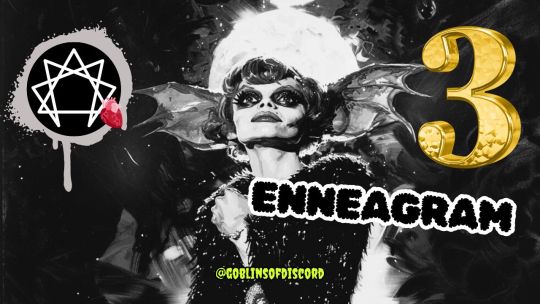
ENNEAGRAM TYPE 3 - “SHAPESHIFTER”
3’s like to see themselves as impressive, competent, successful and admired or valued for what they do or are. Therefore they cannot see themselves as losers, failures, or less than others. Of course, when going too hard into the personality type’s false belief, it creates a big ol’ shadow.
3’s avoid feeling like a failure or worthless by adapting to external ideals, competing, and striving. 3's unconsciously use “Identification” to reinforce their type's ego because it assures them that they are valuable, worthy, admired and successful. Therefore their survival continues.
If the 3 catches themselves in the act, or someone else does (gasp), it may increase the dissonance between the Shadow and Unintegrated Self if they don’t understand that it’s just their personality bs. Because the 3 utilizes “deceit” they are unlikely to allow themselves to own their failings or true feelings if it interferes with the image they’re projecting.
How this manifests:
3's use "Identification" as a defense mechanism, by unconsciously assimilating with the "other." They use this to avoid feeling like a failure. How this shows up is that they take on the traits, characteristics, attributes, aesthetics, preferences, values and mannerisms of important people in their life, groups, people they see as valuable and those they admire or envy. They do this to create an image of success (to themselves and/or others).
Denial/Projection: 3’s can blame others for their failures or what isn’t working for them, offloading image fails onto others to distance themselves from shame. Just like they can take on others traits/behaviors/stories, they can offload those same things onto others as well.
Deception: This collection of traits is their "self image" and where their ego and self-worth resides, and because their external sources and what is valued may change, it can give 3's a shapeshifter quality depending on who or what they're surrounded by, what they value, what they do. Underneath this layer of shiny baubles is still a 'shame type' and so without this sometimes fragile self-image being upheld they are but a raw, shameful nerve. Because of this, they can lose contact with their own internal compass, needs, desires and their authentic self. They prioritize what gets them those positive hits and bolsters their ego/self-image. They can be totally asleep to this inner incongruence, and be deceiving themselves, especially in lower levels of health.
Numbing/Workaholism: 3’s can use numbing so they don’t get stuck in the emotional swamp and become unproductive. They can power down the “I’m a failure, I’m upset, I’m emotional” aspect and power up the drive to override emotional slop that might get in their way. They might override this with going hard into working around the clock, substances, shopping/spending a lot or doing something flashy to bolster their self-image.
Competition: 3’s can get caught up in competition, using others as a stepping stone or a way to boost their own image by comparison (“see how much better of a job I’m doing than Ted.”) They might do this to the point where they end up chasing someone else’s dreams and totally shooting themselves in the foot.
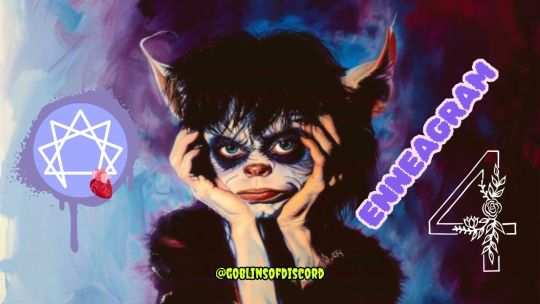
ENNEAGRAM TYPE 4 - “DISDAINFUL DEPRESSIVE”
4’s like to see themselves as separate, uniquely flawed, deep, and the special exception. Therefore they cannot see themselves as mundane, relatable, ordinary, adaptable, or even for many 4’s functional. Of course, when going too hard into the personality type’s false belief, it creates a big ol’ shadow.
4’s avoid feeling mundane, ordinary, relatable, shallow, functional or happy. 4's unconsciously self-sabotage and focus on the negative and what’s frustrating, to reinforce their type's ego because it assures them that they are deep, different, uniquely flawed and unlike anyone else. Therefore their survival continues.
If the 4 catches themselves in the act, or someone else does (gasp), it may increase the dissonance between the Shadow and Unintegrated Self if they don’t understand that it’s just their personality bs. Because the 4 utilizes envy (what is missing) they are unlikely to allow themselves to see where they are functional, relatable, understandable or even happy. They subconsciously craft a self-image that rejects any "positive" information about themselves that comes into conflict with this existing "negative" image.
How this manifests:
Introjection: Introjection is presented as absorbing another person's identity or feelings (like a parent) and transferring it to themselves. However, it's more nuanced and specific than that for 4’s. 4's aren't just taking in any old information, they're unconsciously taking in evidence that they are broken, estranged, alien, fucked up and damaged - and this is great news to them. While the external world may be giving the 4 fuel, their experience has almost nothing to do with the outside world. The outside world is just serving to fuel the 4's internal narrative. The 4 weaves these evidentiary mementos into a story. They identify with specific negative traits that reinforce that they are separate, rare, deeply flawed so as to never quite be understood or capable of being happy and functional.
They do this unconsciously as a way to cope with the pain of feeling broken, unwanted, dysfunctional and different. They weave the negative narratives into their identity and shape it into a way that makes them feel in control of it, to project depth and meaning onto it vs someone or something outside of themselves creating their story and making it shallow. The more they associate into this negative state, the more dysfunctional they can become and the more it supports their type's ego structure. Without these narratives they feel naked and non-existant. Because their self-image is inherently negative, they are “positively” associated with being in a negative, frustrated, unsatisfied state.
Idealization: Idealizing people or situations as a way to generate feelings to pull the 4 away from the mundane reality/experience. This idealization is a frustration pattern designed to keep them in a loop of disappointment and longing because nothing will ever live up to what they hope, something will always be missing and the 4 can never truly actualize or be happy as a result. And if it is everything they’ve ever wanted, the 4 is likely to find something wrong anyway or create a problem where there is none.
As a result, the 4 might self-sabotage opportunities that would actually aid them in being functional, capable, happy, or get them what they claim they want. They may discard things, people, ideas, pursuits if they feel too easy, cheap, relatable, mundane. Or keep churning up issues and provocations that will lead to them being able to say, “see, I never get to have what I want.” Or “I knew no one would understand.”
Splitting: 4’s reject what’s “not me” and often find what’s not to their tastes or “not me” disgusting. Everything that’s not in the frustrated realm that the 4 approves of is superficial, shallow, ugly, vapid, horrible, etc. For the faceless masses, not the 4. Being at odds with reality helps reinforce their self-identity. I’m not like that, therefore I’m deep.
Because 4’s are usually creative or self-identify with the idea of being an artist/writer/creative, their tragically romantic, broken and disdainful views can be expressed through their art. They may overdo it in making it unpalatable or abstract. Or if they become popular they may self-sabotage their own success or self-image by being provocative, turning on their fans/the public, becoming moody, self-destructive or unpredictable. They’ll likely move away from what is expected or desired by their fanbase, even if they secretly desire an audience. Or maybe they’ll over-specify how they present themselves and shroud themselves in mystery in a way that others cannot easily relate to, they can only *bear witness.*
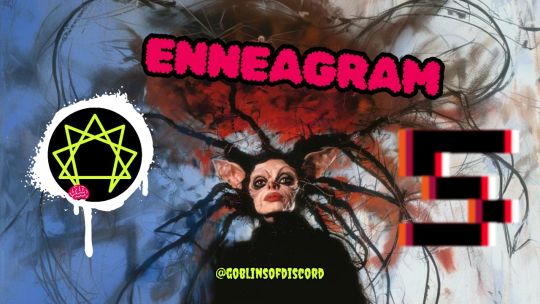
ENNEAGRAM TYPE 5 - “BRUNDLEFLY”
5’s like to see themselves as insightful, competent, self-sufficient, independent and objective. Therefore they cannot see themselves as emotional, human, helpless or dependent on others. Of course, when going too hard into the personality type’s false belief, it creates a big ol’ shadow.
5’s avoid feeling dependent on others, helpless, depleted, or engulfed in the messy world. 5's unconsciously retreat inwards and withhold energy and information, detach, and compartmentalize to reinforce their type's ego because it assures them that they are competent, objective, smarter than everyone else and above the mortal coil.
Because the 5 utilizes avarice (hoarding inner resources) they are unlikely to allow themselves to allow themselves to be put in a position where they are “needed” for anything outside of the scope of their specific interest/competency focus, or entangle themselves with hot messes (people or situations). Of all the types, this is maybe the one that is least likely to give a shit if they have a shadow, tbh.
How this manifests:
Isolation: 5’s retreat and protect their inner sanctum from being invaded or picked clean by the outside world. They use isolation to avoid dependence on others or having to be interlaced with their chaotic whims and needs which may disrupt what the 5 would rather be doing with their time (some kind of mind pursuit). They may design their entire lives to protect themselves against intrusion.
Detachment: 5’s use detachment as a means to cope when they feel overwhelmed. They disconnect from and retreat from their own and others’ unstable feelings. In order to feel competent and safe and conserve their mental resources, they can cut all contact or need for the outside world.
They use ‘rejection’ methods of cutting off and compartmentalizing to ensure they’re not swallowed up in the messy ass human bullshit of this humdrum existence. This may show up as minimizing their needs (physical, relational, financial, emotional). They’re the most likely to live in some secret, off-grid tiny home. Not the one with all the gardens and crops and goats, but the one that has the bare minimum to survive where they can focus on their studies or whatever their mental obsession is, far away from other people.
They can have totally hidden worlds within worlds that others know nothing about. Each world dangerously close to being lopped off at a moment’s notice if the 5 sees no use for it anymore. They dump all of their energy into their main pursuit because it’s where they feel “safe” and valuable, and so the outside world interfering with that feels like an attack on their very existence. By overdoing this one area of “competency” they can actually make themselves unable to actually be independent or functional. So to them they may seem overly competent, but to the outside world they may seem bizarre and dysfunctional.
5’s use compartmentalization of emotions, energy, and relationships. Separating their thoughts from feelings, and putting people into boxes to be dealt with or utilized instead of truly connected to. This can have a dehumanizing effect on the people around them who don’t want to only interact with the 5 when they have the inner resources or only interact with them on narrow and specific terms. By doing this, the 5 effectively shuts out having to deal with whatever they don’t want to but also hacks off pieces of their own heart, spirit, and humanity which is the only true place to create and mine for the insights and independence they seek.
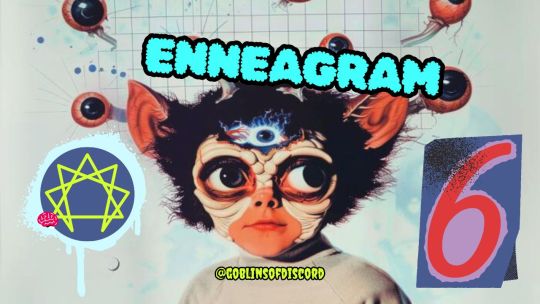
ENNEAGRAM TYPE 6 - “CITIZEN EMO”
6’s like to see themselves as loyal, hardworking, just a regular person, authentic, responsible, fair and connected to the family/community/tribe, etc. Therefore they cannot see themselves as bad, traitorous, pompous or “too good.” Of course, when going too hard into the personality type’s false belief, it creates a big ol’ shadow.
6’s avoid feeling unsafe, uncertain or abandoned in their attachments and support systems (physical, group, partner). 6's unconsciously seek security/safety (and dangers), truth (and lies) and support systems they can trust and rely on to reinforce their type's ego because it assures them that they are accepted, part of the tribe, safe, secure, supported and prepared. Therefore their survival continues.
If the 6 catches themselves in the act, or someone else does (gasp), it may increase the dissonance between the Shadow and Unintegrated Self if they don’t understand that it’s just their personality bs. Because the 6 utilizes “fear” (and anxiety) they are unlikely to allow themselves to relax, ease up, stop hunting for discrepancies or what could go wrong.
How this manifests:
Projection: 6’s project their worst fears and worst case intentions onto other people. They’re always sniffing out danger in the world and in their connections. Who’s being disloyal? Who’s up to no good? They can engage in investigative, gossipy behaviors, seeking out clues of their worst fears. Sometimes they project their own behaviors, feelings and thoughts onto others and then fear being blamed or accused (which leads to projecting).
On the flipside, they can project idolization fantasies onto “experts”, simping people who they can put all their trust and outsource their thinking to. They do this to create certainty within themselves.
Worst Case Scenario: Projections can also show up as “predictions” where the 6 may anticipate the worst and then by overfocusing on this negative outcome, they manifest it into reality. Their worst case scenario becomes a self-fulfilling prophecy. (“See! I knew the basement was going to flood!” Or “See! I knew you’d cheat on me!”) This churning distrust has them always on the hunt, and never feeling safe.
Splitting: Like other types they can see things in “black and white”, good or bad, you’re with me or against me. 6’s can be tribal and overly-identified to their “side” - whether that’s ideologically, politically, religiously or just in their general friend groups.
Outsourcing anxiety: They can overdose on anxiety in order to reach equilibrium. They project their internal anxieties into the outside world in the hopes that someone else will solve the problem for them. Like constantly bringing people’s attention to the negative or what could go wrong. They cannot rest until someone else validates and matches their concern. They want help to deal with the problem (real or imagined) and for someone else to assuage their fears.
Redirect overwhelming fears from one source onto another source that they feel is easier to manage (like a loved one, peer, boss).
Rebellion: 6’s can get anti-authoritarian when their trust is broken, they’re disappointed, or they engage in “splitting.” They can be mega social justice warriors and fight for what is “right”, but in doing so they can totally lose perspective and go so hard in fighting for justice that they actually become the bad guy.
6’s can also be hypochondriacs with their anxiety. Excessive worrying, creating symptoms and scenarios out of the ether. They can circle the drain, fixating on problem after potential problem. They can literally bring forth a potential health catastrophe into reality with constant focus on it. This paranoia can manifest in many ways, but sometimes they’re right!
Self-deprecation: They also may use self-deprecation or humor, or presenting as an “underdog” as a way to deflect being targeted or being seen as too big for their britches. They can project this onto other with a ‘tall poppies’ or ‘crabs in the bucket’ mentality.
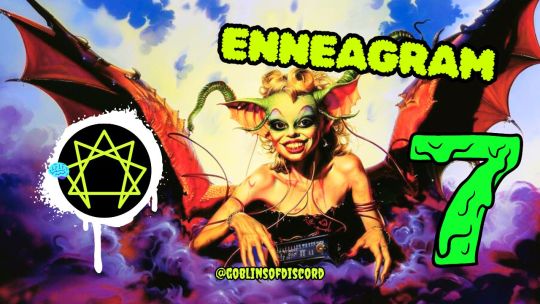
ENNEAGRAM TYPE 7 - “MAD HATTER HEDONIST”
7’s like to see themselves as interesting, exciting, innovative, individualistic, creative and fun. Therefore they cannot see themselves as boring, normal, part of the grind or a downer. Of course, when going too hard into the personality type’s false belief, it creates a big ol’ shadow.
7’s avoid feeling trapped, limited, stifled, cut off and bored. 7's unconsciously seek new, interesting people/things/situations/interests to reinforce their type's ego because it assures them that they are fascinating, buoyant, original and compelling creatures. Therefore their survival continues.
Because the 7 utilizes “gluttony” they are unlikely to allow themselves to stagnate for too long, moving onto the next thing and the next thing and the next thing.
How this manifests:
Rationalization: Which means the 7 can subconsciously (or consciously) rationalize away shitty behaviors and dodge responsibility. They are usually averse to their specific flavours of what is “painful” and will reframe reframe reframe themselves up up up and away from whatever that source of “pain” is. Whether it’s the guilt of doing something awful, or the fall-out of saying something flippantly, or the consequences of a thoughtless action. They’re especially prone to rationalizing if making the pain conscious means they’re not able to do, be or have something they desire.
Distraction: They go into distraction seeking mode via hedonism, intellectual stimulation, adventures, extreme sports, partying, being totally manic and creating for 3 days straight, shopping, etc when they want to avoid discomfort, pain, boredom.
Repression: They use repression to bury negative emotions (in whatever flavour they despise) and push away anything that makes them feel like they’ve been victimized. 7’s can be emotional and melodramatic but it’s in the flavour they find the most interesting. They’re not here to be a boring victim or cry themselves to sleep every night over a loser.
Anticipation/Planning: They can over idealize an outcome to the point where they are more about getting the dopamine hits off anticipation than actually doing the thing or seeing whatever their harebrained scheme is through to completion.
Entitlement: 7’s can be massive brats about getting what they want. As frustration types they’re often focused on what they don’t have and what they want, but because they’re assertive they’re more likely to chase after it, expect it to be given to them, or push people out of the way to get it.
Pleasure-seeking/Hedonism: 7’s reject that which is not pleasurable because there’s nothing in it for them. When 7’s get into this “thank you, next” pattern it can become impossible for them to actualize or stick to something long enough for them to enjoy the fruits of all their initial excitement. The sparkle fades and there’s nothing tasty for the 7 to stick around and lick, so they’re likely to start looking for something else.
Rebellion: Like 6’s, 7’s can also be rebellious, but their reasons for rebelling are likely centered around freedom (literally or freedom of expression), anti-censorship, pro-individuality/individual choice. They can also just rebel for the hell of it if they’re bored, or if there are hot people associated with a cause.
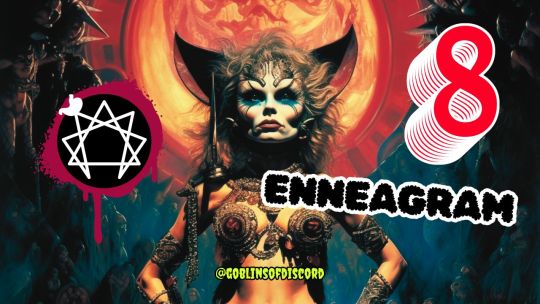
ENNEAGRAM TYPE 8 - “FINAL BOSS”
8’s like to see themselves as powerful, invulnerable, independent, intimidating IDGAF leaders. Therefore they cannot see themselves as weak, under someone else’s heel, being controlled, powerless or soft. Of course, when going too hard into the personality type’s false belief, it creates a big ol’ shadow.
8’s avoid feeling weak, vulnerable, powerless, small or allowing anything to threaten them. 8's unconsciously deny vulnerabilities and weaknesses to reinforce their type's ego because it assures them that they are indeed powerful and no one can or will fuck with them. Therefore their survival continues.
Because the 8 utilizes “lust” they are unlikely to allow themselves to put themselves in a position where they could be steamrolled, deprived, slowed down or made small or powerless.
How this manifests:
Denial: 8’s use “Denial” by rejecting their own vulnerabilities or weaknesses. This can show up as denying emotions, fears, thoughts that don’t serve the 8’s ego identification of being powerful. They can also completely deny the existence of any perceived weak points that an “enemy” could use against them. If possible, they will lop off anyone or anything that causes them agitation (people, situations) or seems like a threat to their inner or outer sanctuary that they’ve created.
Rejection/Coldness: They can view softness and receptivity as death. If they weaken for a moment, they’ll get screwed over or tricked.
Reaction Formation: 8’s can express the opposite of how they feel. So they can feel really hurt but act like they’re emotionally impervious. You have no effect on the 8. You don’t matter. If you’ve wounded their steel heart, you’ll pay the price. Like the 7 they can deny victimhood, but they might personally feel quite slighted and seek revenge to get the ball back in their court, the power back in their hands, for how the person made them feel.
Aggression/assertiveness: 8’s can take up space and project an air of confidence in order to pre-defend against would-be attacks. Showing up with big bear or chaos demon energy ensures no one will fuck with them and that they’ll get what they want. Therefore they can be domineering, bossy, straight-shooters. My way or the highway.
Control/conquering: 8’s can be hyper controlling and even paranoid, depending on their position and the situation. They can take on the role of puppetmaster or dictator, to ensure things happen according to their plan and they’re not at the whims of someone else or underneath someone else’s thumb.
Justification: 8’s can be impulsive with their anger and feeling absolutely justified. The desired effect can be to crush whatever is pissing them off with their brutality and force.
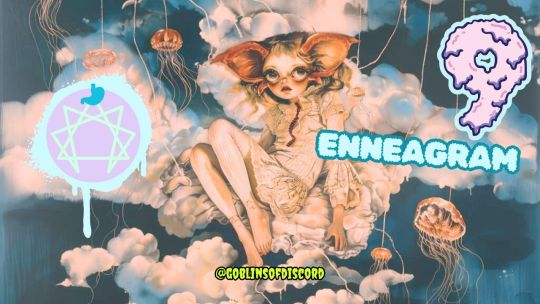
ENNEAGRAM TYPE 9 - “SOOTHING SQUISH”
9’s like to see themselves as chill, empathetic, caring, supportive and deep. Therefore they cannot see themselves as provocative, disruptive, thoughtless, aggressive or selfish. Of course, when going too hard into the personality type’s false belief, it creates a big ol’ shadow.
9’s avoid feeling in conflict and stressed out. 9's unconsciously seek to be in harmony and flow with those around them and their environment to reinforce their type's ego because it assures them that they are chill, harmonious and connected.
If the 9 catches themselves in the act, or someone else does (gasp), it may increase the dissonance between the Shadow and Unintegrated Self if they don’t understand that it’s just their personality bs. Because the 9 utilizes “sloth” they are unlikely to allow themselves to just get after it, make demands, make bold moves.
How this manifests:
Narcotization/Dissociation: 9’s use narcotization which means to numb, to ease discomfort. This can manifest in multiple ways, falling asleep at the wheel of life - outsourcing decisions, independence, physical needs, to others. It can also show up as losing yourself in mindless side-tasks instead of just dealing with problems. They can dissociate from problems by numbing their heart and mind to what’s in front of them, or to just hope it resolves itself without any involvement or disruption to the 9’s existence.
9’s repress their anger in favor of keeping peace. They can be really annoyed and not able to verbalize it until it reaches a crisis point for the 9. The other person may be totally shocked when it happens, especially if the 9 kept telling them that everything was fine.
Passive Aggression: 9’s express how they feel indirectly and hoping the person picks up on their subtle cues without them having to generate conflict. This can also just slip out subconsciously through offhand comments, looks, tone or behaviors. And when confronted with it, they’ll likely recede into a mist and say nothing’s wrong.
9’s can also use “positive reframing”, not unlike 7, but theirs is more used as a numbing agent, smoothing out a dire situation or other people’s malintent, rudeness, or shitty behavior so it doesn’t result in conflict or upset.
Outsourcing: 9’s often give their power away, instead of asking for what they want or expressing themselves without being prompted. They can become disappointed when others fail to mind-read or intuit their needs without them having to assert themselves or vocalize it.
Self-Forgetting: Because 9’s can dance around their location in order to keep the peace and not lose connection, they can forget what they want or how they really feel about something.
Merging: Like 3’s, 9’s merge with the people around them, often taking on their interests, aesthetics, values and even mannerisms. However the 9 isn’t doing it to become an ideal and compete for validation, they do it because they over-identify with the idealized other to create harmony and melt into them.
7’s and 9’s can both procrastinate and get lost in multiple fantasies of possibilities, but the difference is that the 7 is likely taking an active, assertive approach and throwing spaghetti at the wall, whereas the 9’s dreams can fade away if they don’t have another person holding them accountable or a job to show up for or something external.
Ghosting: Instead of just saying “no,” often 9’s will be vague or give a “maybe” or “sure” if they don’t know their location in the moment or don’t want to rock the boat. And then they’ll disappear when followed up with.
SELF-REFLECTION PROMPTS (FOR JOURNALING)
Did you cringe at any of the behaviors listed? did you recognize any of these in yourself?
write out which ones you recognized. no judgment. it's not "you", it's just behaviors Created out of your personality's false belief. Unpack them. go back to the situation. what were you feeling at the time? what was running through your mind?
What did you need to know in that moment to feel totally safe and make a different choice?
What different choice can you make next time?
What would be the worst thing someone could say about you or make you feel?
Is there anything in your life that you can see as you trying to avoid this being said about you, control people's perceptions, or avoiding feeling?
Can you accept this behavior in yourself right now, forgive yourself, and choose to be more consciously aware?
If you want the accompanying "Unf*ck Yourself" mini workshop + pdf workbook join the membership and get it instantly. I apologize for how dry this is. Want to get typed or coached by me? Book here.
#enneagram#enneagram types#enneagram 4#enneagram 7#enneagram 8#enneagram 3#enneagram 9#enneagram 6#enneagram 2#enneagram 1#enneagram 5#Youtube
96 notes
·
View notes
Text
Enneagram system
A rewrite/more in depth post of the Enneagram system compared to my last post on it. Not an expert. May change later.
If you like kpop and typology, check out my blog. I do type analysis on idols and typology notes.
___
What is Enneagram?
I mainly took notes from Riso Hudson theory.
A typology system that categorizes personalities into 9 different types. Each type is numbered from 1 - 9.
Each type has a desire and fear that motivates their actions in life.
Core and Wings
Core: Our main type. It is the foundation of our personality and does not change.
Wing: Acts as a complement to our core. Wing can be one of the two types that sit beside core type. E.g a core 2 can have a 1 wing (2w1) or 3 wing (2w3). But is not necessary to use since wings can change and/or can be balanced.
Levels of Development
Summary of healthy - unhealthy levels of personality
- Healthy levels -
Level 1: Liberation
Let go of self image so we are free to express ourselves however we want. Self acceptance of all traits.
Level 2: Pyschological Capacity
Begin to identify with positive qualities in our personalities and learn to improve ourselves with them.
Level 3: Social Value
Still strongly identify with our set self image and make effort to maintain image. Want to share our good talents and abilities to make a positive effect on self and others.
- Average levels -
Level 4: Imbalance/Social roles
Idealization of self image; have a major focus on either good or bad qualities, no in between. Fear is an obstacle here.
Level 5: Interpersonal Control
Insist on self image being accepted by others, which can cause conflict. Can lead to controlling and manipulation.
Level 6: Overcompensation
Overcompensate due to underlying negative feelings. Desperate for others' acceptance.
- Unhealthy levels -
Level 7: Violation
Desperation for acceptance leads to violation of one's self and others. Serious conflict can occur. May victimize themselves to excuse offensive actions.
Level 8: Obsession and Compulsion
May be overly obsessed with an image of who they want to be. Deceives others
Level 9: Pathological Destructiveness
Most unhealthy state, display very toxic traits and behaviours, may have mental breakdown
Disintegration vs Integration
Or basically Stress vs Growth
Disintegration: When under heavy amounts of stress, a type will go into their disintegration type. They will pick up the negative traits of that type and act like the unhealthy version of it.
Integration: When maturing/developing positively, a type will go their integration type. They will pick up the positive traits of that type and improve their character.
___
* I will only give short descriptions for the triads. I will explain more in depth in individual posts.*
Centers of Intelligence
There are 3 centers of intelligence. Each center shows how and why we solve issues in life.
Gut/Instinct/Anger (types 1, 8, 9)
Gut center focuses on reacting and taking action immediately. This triad has an issue with control and anger.
1: Often perfectionists who repress their anger in order to remain morally good. They see their anger in a negative light.
8: The most open and comfortable with their anger. Uses it to assert boundaries, especially since this type fears vulnerability.
9: Often a passive type that dismisses or downplays their anger. They fear conflict and may worry being more assertive will cause a negative effect on themselves and others.
Heart/Image/Shame (types 2, 3, 4)
Heart center focuses on self identity and connections. This triad wants love and recognition and do what they believe is best to get that. They struggle with self worth.
2: They want to be needed and helpful to others. Pride themselves on being of service. Wants to receive love and to give love.
3: The most image oriented type. They always try to show their best selves and best efforts in order to seem admirable. Fears being worthless.
4: Wants to create a unique image for themselves, believes being boring will make them unloveable.
Head/Thinking/Fear (types 5, 6, 7)
Head center focuses on ideas, making rational decisions, and gathering info. This triad deals with fear and uncertainty.
5: The most internalized head type. 5's want to gather as much knowledge and resources as possible in order to stay secure and independent.
6: Quite an anxious type who seeks security through relations with others.
7: This type fears pain and suffering and seek out experiences in order to avoid negativity.
___
Other triads
- Harmonic Triads -
How types handle conflict, coping mechanism
Reactive (4, 6, 8)
Reactive types are not afraid to show and speak about their true feelings. They may seem "dramatic" in a way.
4: Melodramatic and self absorbed in negative feelings, drowns in intensity
6: Will argue, stick up for the right thing, moody, anxious
8: Big and loud reactions, can be very fiery
Positive (2, 7, 9)
Positive types dislike negativity and conflict and have their own ways of avoiding such tension. Optimistic during hard times.
2: Actively tries to be a good and kind person, only tries to focus on the good aspects of people
7: Seeks out fun opportunities to make their life exciting (basically distraction)
9: Values harmony and peace, will not risk any type of action that will disturb these values
Competency (1, 3, 5)
Competent types are often perfectionists who want to show their best selves. Objective and rational.
1: Strives to be correct and right, wants to be precise in what they do
3: Represses softer emotions to keep up a certain image, thrives with work/passions so they can be the best at what they do
5: Detached from feelings to remain logical and objective, knowledge seeking
- Hornevian Triads -
Relationships with others, how they get what they want
Assertive (3, 7, 8)
Assertive types go against people to get what they want. Do not back down easily, can seem aggressive and forceful.
3: Pushes through obstacles for achievements, goal oriented
7: Asserts their right to have fun, refuse to be restricted
8: Asserts power and strength, places boundaries
Withdrawn (4, 5, 9)
Withdrawn types are very internalized and do not show their needs openly. Deals with things alone.
4: Feels something is wrong with them internally, feels misunderstood
5: Detached from others as to not drain their own energy, will figure it out themselves
9: Introspective, lets life happen
Compliant (1, 2, 6)
Compliant work with people to get what they want. Builds relationships for security, wants to be helpful to others.
1: Doing the right thing instead of one's own wants
2: Focus on other's needs more instead of self
6: Tries to build a safe and secure environment by getting ppl to work together
- Object Relations -
How we are affected by others, our own affect on others, how we react to personal wounds
Attachment (3, 6, 9)
Seek out bonds and companionships for particular reasons. Individuality vs adaptation.
3: Changes their image to suit whoever they are with in order to meet expectations
6: Creates support systems to help with their self doubt and indecisiveness
9: Adapts to the energy of the environment to keep harmony
Frustration (1, 4, 7)
Triad gets frustrated when their needs aren't met.
1: Has a need to improve every little imperfection they find
4: Dislikes shallowness, longs for depth and complexity
7: Not enjoying experiences, not feeling fulfilled
Rejection (2, 5, 8)
Their own needs feel unimportant to others, so they reject their own needs as well.
2: Rejects the need to receive love and guidance, instead focuses on connecting with others and helping them.
5: Ignores and minimizes all their needs, offers knowledge and expertise in some hope of being acknowledged for their intelligence.
8: Rejects by being never putting their guard down, wanting to appear strong and as the protector of others.
___
Subtypes
Claudio Naranjo theory
There are three subtypes/instinctual variants that show our drive in life. There are 27 different subtypes in total.
Self Preservation (Sp)
Focuses on physical safety and security. Our physical health, financial security, obligations, and comforts.
Sexual/One - on - one (Sx)
Wants intensity and deep connections, one on one relationships are preferred.
Social (So)
Prefers to be in a community, wants to create good connections and bonds with others. Socially aware, focus on group goals and contributions.
___
Tritype
Katherine Fauvre theory
A minor but still interesting piece of Enneagram. Tritype is formed of your 3 dominant types from each center. The first number will always be your core, followed by your other 2 dominant types.
E.g 369. 3 = core, heart. 6 = head. 9 = gut.
___
Enneagram notes
___
Side blog:
Kpop astrology @rainy-astrology
Kpop fanarts @rainy-artworks
#enneagram#enneagram types#typology#mbti#enneagram notes#tritypes#triads#enneagram triads#instinctual variants#subtypes#enneagram personality#personality theory#enneagram 1#enneagram 2#enneagram 3#enneagram 4#enneagram 5#enneagram 6#enneagram 7#enneagram 8#enneagram 9#integration#disintegration#stress#growth
193 notes
·
View notes
Text









my sx-types: all enneagrams !!
idk why i forgot to post it there.
tg: lieadiam
#typology#enneagram#ennea#enneagram types#enneagram test#enneagram 1#enneagram 2#enneagram 3#enneagram 4#enneagram 5#enneagram 6#enneagram 7#enneagram 8#enneagram 9#sx1#sx2#sx3#sx4#sx5#sx6#sx7#sx8#sx9#gracaena#typing
48 notes
·
View notes
Text
Enneagram for Character Analysis
Before I start, let me warn you. This will be a long post and a lot of reading, but I'll do my best to simplify things as much as possible in a way that will make sense to most people.
The Basics
At its core, enneagram follows this basic principal. When you were a young child, you were basically, in one way or another, told something that had a profound effect on your psyche. From this unconscious childhood message, you developed a core fear and a core desire. In attempting to resist your core fear and achieve your core desire, you become a self-fulfilling prophecy that makes your core fear come true. These unconscious childhood messages, core fears, and core desires are below.



The Triads
Though there are many ways to separate the enneagram, the three main ways are the main triads. These triads represent the three main things each subgroup of the enneagram are concerned with. When it comes to typing characters or people, this is what you want to start off with.
There are three triads: the instinctive (gut) triad, the thinking (head) triad, and the feeling (heart) triad. Each triad is associated with a core emotion: rage (instinctive/gut), fear (thinking/head), and shame (feeling/heart). Each triad is concerned with different things: control (instinctive, gut), support/guidance (thinking/head), and self-identity (feeling/heart). Three types belong to each triad. And these types will deal with their core emotion and desires in three different ways. They will focus outward, focus inward, or do both.
I will go into each main triad and the types associated with each, but for a general overview, you can read the box below.

The Instinctive (Gut) Triad
The Instinctive Triad includes types 8, 9, and 1. They seek to instill their will upon the world without being affected by it. These types will attempt to put up a wall between themselves and the outer world, so as to say, "this is self, and this is not self." When things threaten to cross this line, aka their boundaries, this results in rage. Now let's go into the types.
Enneagram 8 - The attention of 8s are focused outward. 8s try to protect themselves from the influences of the outside world so that nothing can get too close and hurt them. As a result, their mentality is, as one reference puts it, "Nothing's going to get the upperhand on me. No one is going to get through my defenses and hurt me. I'm going to keep my guard up." However, because 8s are focused outward, so is their rage. They WILL fight anything that ever comes too close to hurting them. They are not afraid of raising their voices, their not afraid of displaying their anger. They will attempt to scare and fight off anything that comes too close. Realistically speaking, you see most type 8s having abusive childhood upbringings. Being an 8 is a rare type and most people will not be that type. I may be wrong about this, but I think the only 8 is Wanderer.
Enneagram 1 - The attention of 1s are focused inward. 1s refuse to be affected by the influences of their internal world. Their rage is focused inward at themselves. They constantly are holding back from their internal impulses so as to say, "I don't want that feeling! I don't want to have that reaction or that impulse!" Because of this, they have the reputation of being perfectionists, holding themselves and others to high standards. They repress their inner desires and are rule-bound. It makes sense why they fear corruption. Some examples of type 1s are Diluc, Eula, and Cyno.
Enneagram 9 - The attention of 9s are focused both outward and inward, in other words, they try not to be affected by influences of both the outer and inner world. In a way, one can say that they ignore their rage, completely under the delusion that it doesn't exist. 9s are primarily concerned with being at peace no matter what the cost, even if this means ignoring the world around them or giving up their wants and desires. Examples of 9s include Kazuha and Alhaitham.
There are easy ways to point out an Instinctive Triad type. Typically speaking, they are not the most emotional of people. They don't get affected by things emotionally as most people do. In my experience, they give off 'leave me tf alone' vibes. Not in the loner sense. But they dislike being obligated/manipulated to feel a specific way or act in a specific manner. They desire to have full control over themselves. There's always a wall between themselves and the outer world.
The Feeling (Heart) Triad
The Feeling Triad includes types 2, 3, and 4. The Feeling Triad is primarily concerned with the development of a self-image. Because they don't know who they truly are, they don't feel they are worthy of love. They feel they are worthless, which results in their core feeling of shame. The Feeling Triad essentially feels that there is something missing from their core. And once they are able to find it, they will come to have self-worth and love.
Enneagram 2 - The attention of 2s are focused outward. 2s look outside to others for validation and a sense of identity. They want to be wanted, so they act in ways which attempt to make this possible. They try to be helpful, friendly, and good to others. However, because they're so focused outside, they often do not know how they are feeling themselves. They often feel underappreciated and have feelings of resentment because of it. Mom friend types are almost always 2s. I am unsure of which characters would be a 2. Maybe Amber? Possibly Yoimiya?
Enneagram 4 - The attention of 4s are focused inward. They try to make a self-image based upon their feelings, fantasies and stories of the past. Namely, they try to create an image on what separates themselves from others, aka what makes them different, but because of this, they often feel estranged from others. They are often moody and have victim complexes, assuming they are the way they are because of the way they were treated in the past. An example of a 4 would be Fischl.
Enneagram 3 - The attention of 3s are focused both outward and inward. Like 2s, 3s need the positive feedback and affirmation of others. They do this by striving for success and accomplishment. By creating an accomplished successful image, they feel they thus become valuable. However, they are like 4s because they need a lot of internal self-talk, attempting to create and sustain a consistent internal picture of themselves. An example of a 3 includes Lyney.
The Feeling Triad are hands down the easiest to type. These people are typically the most depressed and the most insecure. They always have some self-proclaimed self-image they are trying to project, and if you do not validate their false self-image, they can and will get mad at you before getting depressed once more. LOL Long story short, they are a pain in the butt. Are they of the most annoying types? Surprisingly, no. But they are damn easy to point out in a crowd.
The Thinking (Head) Triad
The Thinking Triad includes types 5, 6, and 7. This triad is primarily concerned with finding an inner sense of guidance and support. They focus on the future, wondering "What's going to happen to me? How am I going to survive? How can I prepare myself to keep bad things from happening? How do I move forward in life? How do I cope?" Their minds are constantly active, and their core emotion is anxiety and fear, fear that they do not have the resources to ensure their future. Let's go into the types.
Enneagram 7 - The attention of 7s is focused outward. They charge into the world, adventurous and seemingly not afraid of anything. Where their fear is, however, not of the outside world, but the internal. They fear they do not have the resources to navigate their internal world. They fear being trapped in emotional pain, grief, and especially feelings of anxiety. So what do they do? They focus so much on the outside world that they ignore their internal. If they keep active, their anxieties will not surface. Examples of 7s are Itto and Gaming (I think).
Enneagram 5 - The attention of 5s are focused inward. I'm going to take this straight from a book that "Fives believe that they are too frail and insubstantial to safely survive in the world. The only safe place is in their minds,so they stockpile whatever they believe will help them survive until they are ready to rejoin the world." The anxiety of 5s is what keeps them from external action. 5s are most commonly stereotyped for being bookworms. Although I am not completely sure about this, I would guess and say that examples include Kokomi, maybe Kuki Shinobu, and maybe Mika.
Enneagram 6 - The attention of 6s are focused both outward and inward. As one book says, "Sixes feel anxious inside, and so launch into external action and anticipation of the future like Sevens. But having done so, they eventually become afraid that they will make mistakes and be punished or overwhelmed by demands on them, so like Fives, they 'jump back inside.'" Then they continue doing this in a pingpong action-like manner. I also may be wrong about this, but I feel that an example would be Collei.
The easiest way to point out the Thinking Triad types is that they are all avoidant in one way or another. There is always something they're trying to avoid. Now, DO NOT MISTAKEN ANXIETY DISORDERS WITH THE THINKING TRIAD. While there is correlation, they do not generally do not experience anxiety in the same way people with mental disorders do. 5s fear action, 6s fear trusting their support, and 7s fear their internal world.
Conclusion
There are other aspects of enneagram to go into that give color to the types. These include wings and instinctual variants, but I won't go into that. One important thing about Enneagram is that the theory does not exist to make you feel good. It's the "this is why you're pathetic" personality theory. You will see the most of enneagram when someone is immature. When someone is grown and actualized, you will not see a lot of their core fear or core emotion. This is doubly so when the character in question would not exist in real life (think Luffy or Naruto). Take everything with a grain of salt, but it will help you to get a better view into characters.
#enneagram#ekolu.talks#character analysis#ekolu.headcanons#this is a long post so buckle in you folks#the easiest characters to type are the ones that are immature bc their core fear/emotion is more visible#healthier characters are harder#and when theyre fictional characters it adds another layer which makes it hard to type#the examples i give for each type are heavily lacking i apologize#i... am just too lazy to give every character an analysis to figure out which type they are haha#in terms of likelihood and commonality gut triad is the most common. then head. then heart#also i didnt go into wings here but wings do play a big part in how a type presents itself#for example a 9w1 (kazuha) is very different from a 9w8 (alhaitham)#the way wings work is that you take on traits of one of the types directly bordering your ennea type#so for 9 you can only be a 9w1 or 9w8. not a 9w4 or a 9w6#a 9w1 has 1 traits so theyre more principaled and self controlled#a 9w8 however takes on 8 traits which makes them more willing to give into anger and fight#if youd like me to type any characters pls let me know
10 notes
·
View notes
Text
IPKKND Enneagram: Arnav Singh Raizada
Enneagram Type: 8 (The Challenger)

The Powerful, Dominating Type: Self-Confident, Decisive, Willful, and Confrontational
Arnav is strongly influenced by his basic type, with minimal wing influences from 7 and 9. Hence, I classify him as a pure Type 8, also called The Challenger or The Protector.
All gifs in this post are NOT by me, they're made by the these amazing people - @loveubarunsobti @phati-sari @jalebi-weds-bluetooth @arziaisfrench (also individually credited below each gif)
(if any of the folks above wish to have their gifs taken off this post, pls let me know, I'll do that!)
Here are some fun facts about type 8s. Tell me if it sounds familiar.
Basic Fear: Being controlled or harmed by others
Basic Desire: To protect themselves (to be in control of their own destiny)
At their best: Self- mastering, they use their strength to improve others' lives, becoming heroic, magnanimous, and inspiring. Caring, generous, and highly competent.
At their worst: Vengeful, ruthless, dictatorial, destructive, emotionally shut off. Use any means, including blackmail or violence, to get obedience from those around them, and recklessly over extend themselves in pursuit of their goals.
(Sidenote: I didn't paraphrase any of this...its taken verbatim from various sites...did the IPK makers refer to Enneagram type 8 when writing Arnav??? lol)
Understanding Arnav's Core Personality as an 8

As their name suggests, 8s love challenges. This is where they shine, this is what they enjoy. Arnav completely embodies this - he thrives when he is fighting to prove himself, loves setting challenges for others, and admires those who manage to compete at his level. I mean, this is basically the entirety of Arshi's courtship lmao.
Another one of Arnav's most 8-esque qualities is that he is a tremendously charismatic leader with a natural tendency towards taking charge and the innate ability to inspire people to follow him. 8s act quickly and decisively in stressful situations, seeking out logical, practical solutions, and taking charge of dealing with troubles. Hence, they often become the rock to cling on to in tough times. They are willing to take the heat for unpopular decisions that they judge to be right. Full of natural confidence, resourceful thinking and common sense, they strive to use their abilities to take care of everyone dependent on them. If they are the head of a family, fairly looking after everyone's needs is important to them. All of this is why he is the Raizada HBIC when he has like 5 elders in line before him. It's not just about the fact that he is AR Designs CEO/billionaire. The Raizadas implicitly trust him to take the right decisions for them because he has proved to be a worthy leader in crisis periods.
At the same time, a source of great annoyance for his family is another of his classic type 8 qualities - 8s do not fear public opinions and can easily defy disapproval if necessary. They will refuse to give in to social conventions that do not suit them, with zero shame or fear of consequences, which can seem inspiring, intimidating, or even infuriating, depending on where you stand lol.
Also like a typical 8, he is extremely ambitious and has impressive willpower which drives him to set, and usually achieve, big goals for himself. Be it his professional ambitions (successful) or his idiotic commitment to fighting his feelings for Khushi (vv unsuccesful; try again next time).
Arnav's shares both of the core fears of an 8. First, he fears being harmed by others. This doesn't imply Arnav is a coward who runs from a physical fight...the opposite. In fact, 8s have tremendous physical endurance, to the point where they are often harmfully negligent of their own health. Arnav has shown this trait repeatedly - the hot tea incident, the multiple times he fainted due to neglect etc etc. So Arnav's fear of harm is not about physical blows but more to do with emotional harm, specifically betrayal or abandonment. 8s absolutely hate the idea of being emotionally dependent on any one and often construct strong emotional armours to push people away and hide their paradoxical inner emotional vulnerability. Ummm...yeah. The turning his head away to hide his face any time a conversation with Anjali (or later Khushi) enters remotely emotional territory. How he makes it a point of pride that Arnav Singh Raizada NEVER says "sorry" or "happy birthday". And of course, the MANY times the extent of his passion towards Khushi freaks him out and he responds by pushing her away by any means possible.
Their second fear is that 8s are terrified of giving any one any power over them - be it social, psychological, sexual or physical. No matter what their sphere of life, retaining and increasing their power is extremely important to them. And Arnav is absolutely obsessed with power and control especially in the romantic/sexual/emotional realm. The most obvious example of this, of course, is how he seeks out romantic relationships that allow him to be minimally emotionally engaged, and where he has much of the control. After the first break up with Lavanya, his indifferent reaction may seem cold and almost cruel to us (and Khushi lol) but from his perspective, that's exactly his ideal relationship - where he remains totally unaffected by being dumped and his heart isn't involved at all. And then OF COURSE his entire relationship with Khushi is defined by this fear. So many of his actions in the show are motivated by a deep fear of the sheer intensity of what Khushi, the girl he is supposed to look down on/ignore/hate, makes him feel.

He is triggered as all hell whenever Khushi proves her totally unconscious power over him (physical or emotional). Such as Diwali when the feelings he has for her almost made him cheat, an action that is abhorrent to him and he is staggered, HORRIFIED by this fact. How does he react? By doing his DAMNDEST to re-exert a measure of control over the situation. The tremendous anger he feels there comes from a place of absolute fear at his loss of control because of the Khushi feelings. Her questions about the poolside moment and the payal highlight to him just how much power she has over him and how close she is to discovering it. And he launches his campaign of trying to "win" over those feelings, trying to erase them and revert to a position of absolute indifference to her and control over himself and his surroundings. Trying to double down on his commitment to the "safe" relationship with Lavanya, one that doesn't threaten his emotional safety one bit, that keeps his heart safe and sound locked away in a dungeon somewhere. Its an absolutely classic type 8 move to pursue a course of action that is not only harmful to others, but also to your own self and in opposition to your other priorities, just so you can prove a point to yourself about control control control. He does NOT believe in marriage or want to be married, certainly not to Lavanya; he doesn't want to be rude to and hurt Khushi and doing so hurts him also; he feels pain when she thinks badly of him or cries due to him - YET - he commits to this very course. He chooses to prioritize his ego, his need for control, over all other considerations, including his own happiness and peace of mind. While on this trip, the utmost need in his mind is to prove that those feelings for Khushi DO NOT control him, even if that means he keeps making choices that are deeply emotionally painful for him and everyone around him.
And if he can't erase or control the feelings, well, at the very least, NO ONE, least of all Khushi, the dangerous wielder of that scary power, should know any thing about them. That's why he does everything to push her away, down to hurling at her that IT DIDN'T MEAN ANYTHING. The gentleman doth protest too much.
This reading can be applied to so many of Arnav's actions, especially some of the cruellest ways he lashes out at Khushi when she has done nothing (at that moment) to really earn it. Like during the contract marriage, he is tortured by the fact that no matter how hard he tries, how much he intellectually loathes her, emotionally, he still feels concern for her. She betrayed him! The worst happened - his worst fear came true - he gave someone power over him and they used it to hurt him emotionally - and he can't even escape the cycle of pain, he has to live in it, every day he has to content with the fact that he harbours intense feelings that keep growing against his will for this traitorous person. It is a nightmare situation for an 8.
The more she starts affecting his mental, emotional and physical reactions in ways that shock him, the more triggered he gets and the more he either pushes her away or pulls her into toxic power games. This is his classic pattern from early on in their whatever-ship, from the increasingly unhinged office challenges post the red sari scene, to the farak padta hai games, to forcing her to marry him, to the entirety of the contract marriage.
It's also because of these core fears that 8s dislike any type of manipulative or lying behaviour. They do not appreciate being made a fool of or being emotionally blackmailed and will immediately be extremely suspicious of any outsider who attempts such things with them. The reason is that they ARE very vulnerable to emotional manipulation from loved ones - so they want to ensure they don't let people in who would take advantage of this weakness.
Arnav as a Stressed/Unhealthy 8
After the first Lavanya break up, Khushi hits a little too close to the truth when she asks Arnav "did you ever even love her at all? are you that heartless?" and Arnav's responds (in essence) "yes, I am heartless, and everything that has happened proved me right. love is a stupid illision and causes nothing but pain, we're better off without it". This is a CLASSIC unhealthy 8 that is totally blocked in his ability to love. Because love requires vulnerability and giving the other person power over you, which contradicts their basic drive for emotional autonomy. An unhealthy 8 is dominated by their core fears and that stops them from experiencing or expressing love in a healthy way.
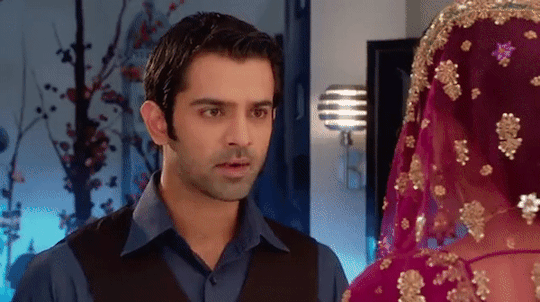
An 8's hard working and ambitious nature, combined with their emotionally distant tendencies makes them prone to being workaholics and emotionally negligent. This can lead to dissatisfaction and complaints of neglect amongst loved ones. We saw Anjali complain about this multiple times, but it really hits home with Khushi post the kidnapping. After calling her the biggest mistake of his life, all he had to do was say sorry, I love you, I want to stay married to you forever, and Khushi would have forgiven and forgotten everything in an instant. His silence on the matter combined with his emotionally distant/volatile actions fans her insecurities to the point that she first attempts to, and then leaves. This breach is eventually healed only when they are able to have an honest, emotionally vulnerable communication about the nature of his feelings for her and their marriage (this is what the pearl necklace scene is supposed to be - there wasn't much verbal conversation but you know what I mean lol).
The funny thing is, underneath all that emotional coldness, 8s have a potent fear of rejection and abandonment. Subsequently, they are sensitive to any such indicators of dissatisfaction in loved ones. They hate to feel that a loved one is dissatisfied with them or misunderstanding them. This kicks in their fear that they have lost control of the situation - they may be about to be rejected and can do nothing about it. When in an unhealthy space, where they are still ruled by their core fears, they often react by resorting to bullying behaviours to assert their dominance and control over the situation. Even once Arnav, to a degree, accepts his feelings for Khushi, he still choses to woo her through "challenges" (the 24 hour track), blackmail (Buaji's house rent) and threats (I'll pick you up and take you with me if needed Khushi!). It's still extremely difficult for him to be emotionally vulnerable and communicative and leave himself open to being rejected. He prefers power games and challenges. He wants all the cards to always be in his hands.
Stressed 8s often become secretive, fearful, and guarded in their behaviours. The most terrifying thing an 8 can imagine is not merely to be cheated in love - it's to be cheated in love and then have that loved one mockingly laugh at their "victory" over them. I think Arnav does fear confronting Khushi about Shyam because, among other reasons, he can't face it if she also does a turn face like Shyam and starts a villain monologue laughing at him. He definitely knows they had some kind of flirtationship during the Payash wedding and he now believes that was her manipulating him in order to distract him - and it would be torturous to hear this confirmed from her mouth.
It's not just in the love/romance arena that Arnav's unhealthy 8 traits manifest. The Arnav we see in the beginning might be tremendously successful but he isn't exactly a mature, evolved professional. His extreme egoistic behaviour is proof of this. 8s often build up their ego as a defence against the world, becoming extremely sensitive to "slights" to their authority or self-respect. Combative and intimidating to anyone they perceive as a threat, they can become increasingly hard-hearted and cruel in a quest to retain power and "win" against threats. This is ASR at his worst.
Arnav's Journey to a Healthy 8
Khushi's love for him AND his love for her, plays a huge role in Arnav's journey to healing. 8s feel most content and secure when a loved one knows them, and accepts them unconditionally, as they are, no qualification or complaints; they are happiest with a partner, and a family, that has an instinctive understanding of their actions, their feelings, their motivations, without them having to say any of it out loud.
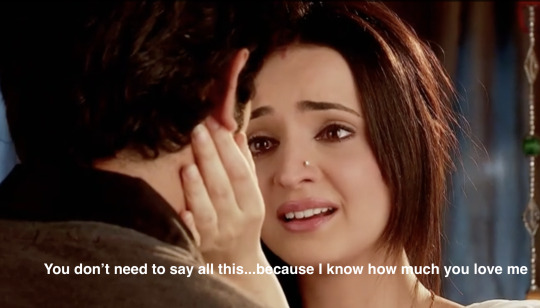
This is why Khushi's words "I know (that you love me) (you don't have to say it)" - both after he apologizes and before they consummate their relationship - hold so much meaning, and affect him so deeply. This is the assurance that he craves, someone who innately just gets him.
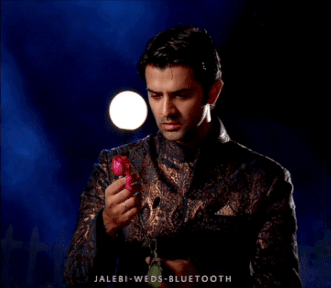
Arnav's decision making process on his second wedding day truly embody the moves of a healing 8. Healthy 8s who have overcome their deepest fears, can recognize their paranoia for what it is. They move towards devaluing the importance of "power" and "control" especially in their personal life and make a conscious choice to prioritize real needs (their own and others) over their ego or their fears. Arnav choses love over hatred, hope over fear, and that's an 8 stepping into their best self.
Evolved 8s are open-hearted and caring; they channel the best of their abilities to become passionate yet generous, resourceful yet empathetic, and authoritative yet honourable; a true leader worth following.
Wings - 7 or 9?
Like I said earlier, I classify Arnav as a purer type 8 with minimal influence of his wings. However, between the two, I would say he has a greater influence of his "9" wing than "7" wing.
The 7 wing adds a taste for experiencing life to the fullest and a gregarious, extroverted, risk-taking side to an 8s personality. I considered 8w7 for Arnav because I do think he has a taste for the finer things in life, he has a powerful charismatic aura, and is comfortable with taking risks; but ultimately I discounted it because I don't think any one in their right mind could call him "extroverted" or "gregarious" in the slightest. I also don't think he is experience-oriented like a 8w7 would be, his ambitions are more concerned with his own business, his family, and his power, not with "living life to the fullest".
The 9 wing too does not appear to be a great fit at first glance - 9s are pretty much the opposite of 8s, being peaceful, conflict-avoidant and complacent. These aren't words I associate with ASR lol. Yet, this is what I chose ultimately. The 9 wing supposedly adds a soothing, family-oriented effect to the dominating and wilful 8 personality. Arnav is definitely very family-oriented. Additionally unhealthy 8w9s often exhibit an almost scary duality - a calm, gentle nature with loved ones and then an aggressive mode when faced with threats, at work, etc. ASR/Chotte/Arnavji. Rakshas/Rajkumar. And remember Khushi's comically shocked face when she saw ASR-at-home avatar for the first time?
Early days office Arnav reminds me a lot of 8w9s. 8w9s often combine indifference with aggression, often employing cold, depersonalized violence to exert control over others. Behind their calm and seemingly emotionless demeanour hides an explosive and unpredictable temper. Check and check.

Consider the name of the 8w9: The Bear. Aggressive and scary to outsiders, cuddly with their loved ones. Firm and decisive, but also measured and cooperative. Isn't that Arnav? Especially the Arnav we are left with at the end of the show? I believe Arnav started out a strong 8 with a slight 9 wing influence, but as he matured over time, his natural tendency for the 9 wing also developed in a healthy manner, and he became calmer, more accommodating, more openly loving.
#ipkknd#enneagram#arnav singh raizada#fun to do but post turned out much longer than i though it would!#Arnav was so easy to type. both bc he is so well written and bc he fits the most stereotypical 8 template so well lol
55 notes
·
View notes
Photo


(via Enneagram Comparisons - Type Eight and Type Nine)
#enneagram#enneagram types#enneatypes#enneagram type eight#enneagram type 8#enneagram type nine#enneagram type 9#9w8#9w1#8w7#8w9#mbti#mbti types#personality types#personality traits#personality tests#personality typology
0 notes
Text
My thoughts on The Raven Cycle Enneagram types:
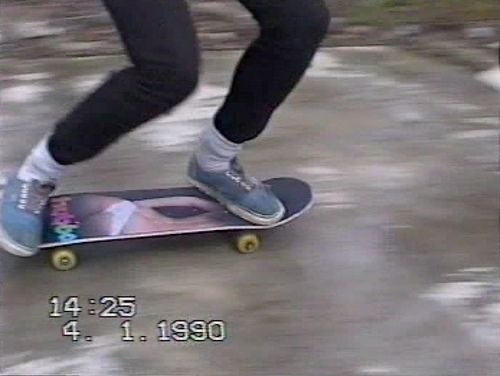
Noah - Type 9(w8)
I always try to go by core desires, but I think this one is pretty obvious from the moment we meet Noah. 9s desire peace, and everything Noah does is related to making a more comfortable environment for him and his friends. He’s the one person who asks Gansey how he truly feels and takes Ronan seriously, and he tries to lighten the Blue/Adam situation even though it’s painful for him. He never burdens everyone else with his own pain (although I wish he would :(, he deserves to be taken care of too), and I feel like that’s so truly 9. I’m a little unsure on his wing but I think 8 makes sense given his history with Whelk and multiple girlfriends and not caring too much about morals. Also, after watching ATLA and noticing Aang’s 7ish behavior in the earlier seasons, and him totally being a 9, I think it really makes sense for Noah too.

Blue - Type 5(w4)
Blue is typed as a 4 most of the time, just based on her desire to be different, but I don’t really think that’s her desire. 4s also typically feel insecure about their differences, but Blue is never ashamed of being the psychic’s daughter. She definitely has 4 tendencies, with the baseline of being different from other people and using those differences as a strength. But I think her desire to be sensible, and also wanting to explore the world and find “something more” is very 5core. She wants to understand the world around her, but the things she wants to understand aren’t typical things. That for me is what cements her as a 5w4.

Adam - Type 8(w9)
I’ve already talked about this before, but Adam is probably the most well-characterized 8w9 I’ve ever read about. Lots of people say he’s a 3 because he’s very ambitious, but 3s care a lot about their image, and while Adam is insecure about his upbringing and how he appears, he doesn’t do anything about that. It’s not like he tries to look like Gansey to be more successful, because that’s just not who he is. He never pretends to be something he’s not. He doesn’t accept help from Gansey and always tries to do things by himself. He takes Gansey’s pity as a weakness and feels pathetic when he gets as angry as his father. 8w9s typically demonize the rage of 8w7s, and are much more calculating, which definitely fits Adam. Most importantly, though, Adam wants freedom. He doesn’t see money and success as something that will necessarily make him valuable to society, but something that will get him what he wants. He wants to “be his own master”. “The most important thing to Adam Parrish had always been free will”.
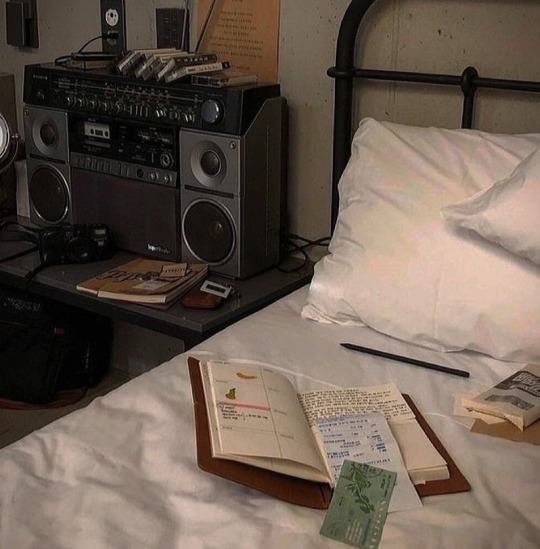
Gansey - Type 3(w2)
Gansey’s is one of the most interesting characterizations I’ve analyzed. I talked about this before too, but he has this core pride and knows that he’s better than a lot of the people surrounding him, but he’s always trying to even the scales and help other people. 3w2s to me seem like people who think they’re destined for greatness and want greatness but are almost tied down to the people around them. Gansey as a 3w2 is definitely really obvious, but that core pride warring with that desire to help people and be a better person is so fascinating. It’s that need to make an impact and find something so special and wondrous, but use that to help people, and not hurt anyone in the process.
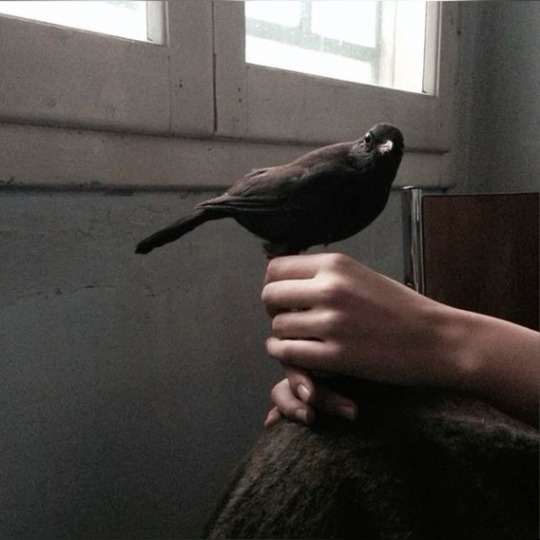
Ronan - Type 7(w8)
Ronan is usually typed as an 8, but here’s my proof that he’s a 7: 7s in stress move towards 1, and become critical and idealistic, unsatisfied with everything and constantly tearing other people down because they haven’t processed their own sadness. 8s move towards 5, and become cold and calculating, preferring to do things strictly by themselves and disassociate from the people around them (like Adam). Ronan’s character arc surrounds his grief, his sadness, and that hole in his heart is always temporarily filled. But Ronan, on the inside, is such a sweet kid. That scene in the Dream Thieves with the mouse? Where he’s talking about how cute it is and then remembers how he used to play with them when he was a kid and his family was so perfect and how it’s not anymore, and then says “whatever it’ll be dead in like a day, lifespan’s shit for field mice” because he doesn’t want to process anything?? Peak 7 behavior.
Anywayyyy those are just my updated thoughts all put together
#the raven cycle#the raven boys#blue Sargent#Ronan lynch#Adam Parrish#richard gansey iii#richard gansey#richard campbell gansey the third#richard campbell gansey iii#enneagram types#enneagram#mbti#personality types#personality#enneagram 8#enneagram 3#enneagram 5#enneagram 9#enneagram 7
20 notes
·
View notes
Note
i’m curious about the e8 sin of lust/excess, i’m an e9 and i do relate to the “self laziness” thing but i also definitely crave the sensory experience and stimulation, the satisfaction, the “adventure” and feeding of my “hunger” and to do what i want autonomously and to live life to the fullest/on “10” - but i’m also a se dom with a 7 fix lmao 😭 so i wonder where the distinction is i guess?
"hunger"
what an interesting, complex, beautiful, stimulating question 🥺🥺 mamma mia
e7: gluttony
i feel like the difference between e7 and e8 is the same difference between gluttony and lust.
lust (8) is all about intensity or "quality." gluttony (7) is all about "quantity."
up to some point, an 8 will be satisfied with what they have, but 7's don't really ever feel satisfied. an 8 will seek joy, pleasure and whatnot until they feel "powerful" or "in control." a 7 won't ever feel like they have enough no matter how much they have.
another difference is that 8's are much more focused on a set amount or specific pleasure. for example, they might have a certain vision that they really really really want to travel the world (as you say, is your "adventure"). drinking might make them happy, but they could never substitute that for traveling.
a 7 on the other hand will find a way to fulfill themselves no matter what. if the are unable to travel, they'll "fill the hole" with other things: gambling, watching tv, etc. sure, they might be small differences. but they get the same feeling from all.
the 8 seeks a "thing." the 7 seeks a "feeling"
e9: numbness
i think e9 and e8's difference is relatively clear in terms of hunger, but e9 and e7 are very very similar in the aspect of indulgences you describe- especially an sp9.
descriptions just don't do them justice when trying to tell the difference, so i will give an example:
an enneagram 7 likes to party. they come back from a night out, and they feel great! but after a while that feeling goes away and they just want more. they go to another one, and another one, and another one...and they keep thinking that each time will be better than the last. it's a constant chase, but it's as if they can never really achieve it
an enneagram 9 has already given up. they realize that parties are unfulfilling and recognize how it might harm them. but a single moment they feel happy at the party is basically enough for them to keep doing it. it's almost as if instead of chasing, like the e7, they have just "given up" and let themselves indulge. they kind of have this "eh, whatever" thinking: "i am going to seek this out anyways so might as well go"
#enneagram 9#enneagram 7#enneagram 8#enneagram types#9w8#9w1#7w6#7w8#8w7#8w9#type 9#type 8#type 7#infp#infj#estp#istp#estj#entp#enfp#esfp
23 notes
·
View notes
Text
Enneagram 8 Subtypes Explained



Social 8 "Complicity"
As the Counter-type of Enneagram 8 this subtype looks to fight for others and find strength in the connection with other individuals. Unlike the other subtypes of E8 they conceptualize power as a thing to be shared and enjoyed by others. This subtype is usually attracted to leader roles in which they can help others get equal treatment. This subtype tends to have a softer and less aggressive edge than the other 8s which may cause them to look like 1s or 7s.
Characters: Leia Organa, Gon, Esmeralda, Luffy, Thomas Shelby, Samantha Wilkins, Damien Wayen and Korra.
Self Preservation 8 "Survival"
The most 8 of all 8s; this subtype is focused on getting what they want. For them it's about always having the last word and doing as they please. From this description they may sound a bit like an Sp7 however, unlike the Sp7 its not about doing so because its fun or enjoyable to them but rather because its about what they want (or because they can). This subtypes can be viewed as rebellious, uncaring and unrelenting on their approach to life. It's impossible to mistype them as they usually are very on the nose about their reasoning (if you have difficulty telling them apart from SX4 and SX6 then simply make reference to the core desire of the former types).
Characters: Wolverine, Vi, Soldier Boy, Faith Lehane, Katherine Pierce, Bakugou, Nobara Kugisaki, Kazuya Mishima.
Sexual 8 "Possession"
This 8s carves nothing more than to create a strong emotional connection. They are like the inverse of a SX2; the SX8 looks to find someone who they can show their control and strength to. The intensity of desire is for the SX8 is of most importance. It's about what having that intense emotional attachment to that gives them the sense of strength and power they crave. However, unlike the SX2 they DONT look to please their partners needs or filter themselves for them.
Characters: Inuyasha, Anakin Skywalker, Rogue, Power, Nancy Downs, Ko Moon-Young, Tyler Durden and Nate Jacobs.
#mbti#personality types#enneagram#16 personalities#mbti personality types#zodiac#ennegram#zodic signs#typology#personality typology#enneagram 8#type 8#8w7#8w9#arcane spoilers#arcane violet#violet arcane#tlok korra#monkey d. luffy#one piece luffy#thomas shelby#leia organa#marvel comics#jjk nobara#nobara kugisaki#tyler durden#inuyasha#chainsaw man#power chainsaw man#mha bakugou
17 notes
·
View notes